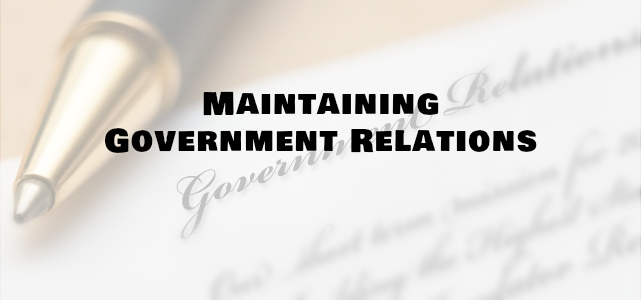Government Relations (GR) is all about effectively engaging with the arms and extensions of the executive; the various ministries and departments; and also sometimes extending to Members of Parliament or Legislative Assembly. The GR goals for an organisation typically include providing adequate representations regarding sensitive issues or matters of policy, gain support and assistance on policy, and influence and enhance the corporate positioning. What is important is this activity must ensure the organisation’s message is communicated in an effective, professional manner to the government.
Services offered include:
- Government liaison and negotiations
- Influencing legislative change
- Research and issues monitoring
- Policy assessment and analysis
- Preparation of papers
- Submissions/presentations to government
Organisations’ regular contact with senior public servants, State and Central Ministers, local government, NGOs and other community representatives can give them an understanding of the current issues, knowledge of the internal working of the government, and access to decision-makers.
In Government affairs, there is no ‘thrill of action’
The day-to-day working here most often has no immediate or short-term rewards; rather a single activity or campaign can be a long and drawn-out affair, points out Rishi Seth, Founder and CEO, Evoc. Coming from someone who has rich experience in this area – this is very well put. For, it is to be noted that he has worked in the office of a Parliamentarian and a former Union Minister, and he is well-versed with both Public and Government Relations.
Pointing out the difference between PR and GR he elaborates, “in PR, one could offer a story to different journalists or media houses but in government affairs, this luxury of engaging with multiple officials is simply not there. Because you have to engage with one official or minister at a time, your pitch has to be meticulously thought out, if it has to persuade and impress government officials”.
Here are some tips:
Persuasion powers come into full play: Persuading and convincing is a completely different ball-game in the case of government relations, he suggests. Finding out who controls the levers of decision-making is just one big challenge; unlike in media relations where you know the respective roles of reporters and editors and can take your pitch to the appropriate person easily.
Being very methodical is the rule of the game: Government Relations is all about being very methodical in the pitch – whether it is a letter, a representation or a presentation – it has to be flawless, foolproof and convincing. Unlike in PR where you have the luxury of refining your pitch even after one or more journalists have refused; in GR we do not have the choice of pitching to another official.
Being patient: The field of government relations seldom offers the thrill of immediate results, whether measured in stories published or social media reach achieved, says Rishi. It’s a game for patient players and those who cannot live without the thrill of immediate action or results are best advised to stay away from it.
Government affairs is similar to B2B selling
In many ways, Government affairs is similar to B2B selling, explains Rishi. The two golden rules one should keep in mind are:
- Hit at the top: You have to start from as near to the top as is feasible. Remember the real power in the government, like any corporation, always sits at the top; and if you can gain the support or trust of the senior-most officials; the battle is easily won.
It must be a consultancy approach to conversations. - Always take a consultative approach to discussions: Similar to B2B sales cycles that can go anywhere from three months to six months or even longer, government decision-making is deliberate, well-considered and long-drawn. “To convince or persuade the Government of the merit of your case, the process can easily stretch for more than a year,” he spells out. You have to consult and tailor your proposition for the different levels of decision-makers, bureaucrats or even Ministers and your representation or proposal must take into account each of the following questions.
- Is it in line with the political vision, policies or an important initiative of the government, or does it violate it? For example, after the introduction of “Make in India”, if an auto maker wants government support to set up a new factory in Bangladesh, one can well imagine the response!
- Is it disturbing the industry equilibrium? Citing examples Rishi clarifies this point. If Indigo says they want to set up airports where only they will fly; or when Jio started offering data and voice for free, thus killing the business model of telecom companies; that’s when the regulator stepped in and forced them to withdraw the free offer. Here we must remember, that if the industry equilibrium is disturbed or disrupted, the outcome must be in the public interest of the customer.
- Is it beneficial to the public or any other stakeholders; or does it hurt them?
- Will it leave a negative impact on government revenues? For example, a representation for tax concession will almost always be shot down, unless one can demonstrate that greater public interest will be served through this concession, concludes Rishi.








Be the first to comment on "Government Relations: Some tips for PR professionals"